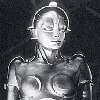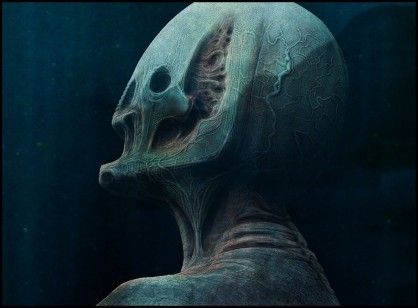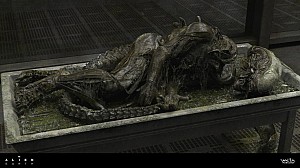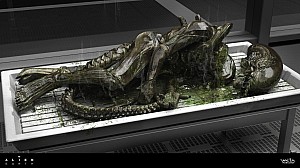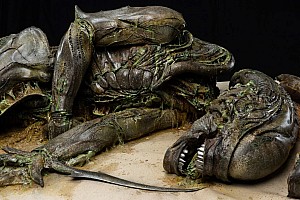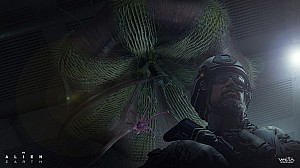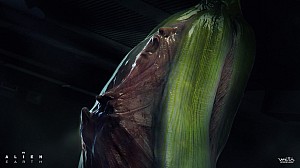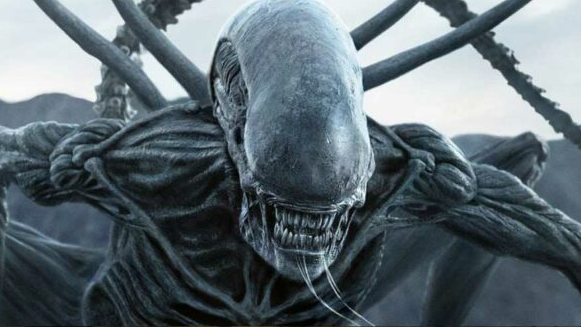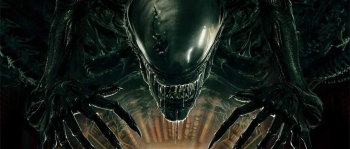An Incredible IN Depth Review Of "Donnie Darko" By Lawrence Person!
Prometheus Forum Topic
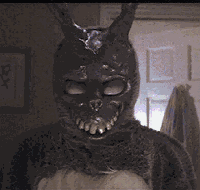
Spartacus
MemberOvomorphJul 9, 20125589 Views19 Replies[img]http://img.photobucket.com/albums/v234/LT.HIGHTIMES/1a1darko1.jpg[/img]
One of my all time favorite films was a massive Flop at the box office, and in it's subsequent DVD release perhaps one the greatest cult smash hits of all time. The film I speak of of course is Donnie Darko and almost each and every person to a Man or woman I speak with whom has seen this film says the same thing..."I Loved it". Being slow and stupid I missed the DVD release and the fact that it does in fact include an extensive and extended version of the film which explains a heck of a lot of stuff in it. Which is good cause I am slow and dumb haha and I believe it came out in 1988 or 89 {it actually all takes place in 1988}and I am still trying to figure out a lot of this film, it;s one of those films that doesn't just stay with you, it hauntingly lingers forever I think once anyone sees it. For any film to do this which is in and of itself hardly easy to understand all together is incredible...so I wet looking...and what I found left me exhausted and frustrated because inevitably like with Prometheus there are going to be things that I am never going to fully understand I think in the way they were intended just because this is a thing so easily lost or misinterpreted in the translation of any story to film. But this, is the best dissection to date that I have found of this film and it opened my eyes a lot...I would love to hear what others think about what the MEANING of this film was and what exactly the writer/director RICHARD KELLY was trying to say..
[url=http://www.locusmag.com/2003/Reviews/Person04_Darko.html]DarkoByPerson[/url]
[b]First time writer and director Richard Kelly has produced a funny, moving and distinctly mind-bending journey through suburban America. Set in 1988 the movie is a psychological science fiction film about a boy named Donnie Darko who, after narrowly escaping death, has visions of a giant rabbit named Frank who says he’s from outer space and the future.
The demonic looking bunny predicts that the world will end in 28 days, 6 hours, 42 minutes and 12 seconds and sends Donnie on a rampage.
The movie explores time travel, the concept of parallel universes, mental health issues, relationships and mortality. However, at the centre of Donnie Darko is the simple story of a boy trying to make a stand in a lonely, chaotic world – and discovering that every little thing he does counts on a cosmic scale.[/b]
[img]http://img.photobucket.com/albums/v234/LT.HIGHTIMES/1a1darko3.png[/img]
Donnie Darko's theatrical release came and went so quickly I was barely aware of its existence. That made it all the more surprising when I glanced at the Internet Movie Database list of the highest user-rated SF films (http://us.imdb.com/Charts/Votes/sci-fi) to find it ranked ninth overall. Is it that good? No. Nor is it better than Blade Runner, Aliens, Forbidden Planet, or Brazil, some of the films below it on the IMDB list. But it is one of the most original, complex, and interesting SF films to come out of Hollywood in a long time, and it may very well be the most overlooked SF film of the last decade.
That Donnie Darko was made at all is a credit to the clout of Drew Barrymore, who acted as Executive Producer and "Fairy Godmother" for the film in addition to playing a supporting role as sympathetic teacher Karen Pomeroy. (I can just imagine the close of the pitch session: "OK, Drew, we'll help you make this weirdo art thing, but for your next film you're gonna have to get naked again...") It's simply anathema to Hollywood's pigeonhole-driven marketing. It's not just a science fiction film, or a teen drama, or a "classic psychological thriller" as the idiot blurb on the back of the DVD suggests. It's a weird dark science fiction prophetic teen angst black comedy romantic time travel thriller religious parable, which is too long a description for a category sign at Blockbuster. That was the first strike against it at the box office; the second was featuring a falling airplane engine and being scheduled for an October 2001 release. All this makes it an ideal candidate for a second life on DVD. (And, as you'll see further on, second chances are one of the film's primary themes.) And it's only on DVD that you can figure out what first-time writer-director Richard Kelly was actually trying to achieve.
Donnie Darko isn't a great film, but it is a film that aspires to greatness. It has more ambition in any single scene than most big, stupid, special-effects-laden Hollywood SF extravaganzas manage for an entire film. Despite that, it's still seriously flawed. Describing what those flaws are, and explicating what the film is about, will require more than the average amount of plot summary, and more than the usual number of spoilers. I strongly recommend anyone with a taste for ambitious SF to stop reading now, watch it, and then think about it for a day or two before coming back. Many of the film's rewards come from surprises in the unfolding narrative, of mentally knitting together the many diverse plot strands, and even working through some of the film's frustrating ambiguities. Go ahead, go see it. Unlike Donnie, I'll still be here when you get back.
The movie's titular protagonist, played winningly by Jake Gyllenhaal, is a smart but troubled teenager, the middle child between sisters. Despite loving parents and "intimidating" test scores, he's sleepwalking, on medication, has the occasional bit of arson in his past, and is seeing a $200-a-session psychiatrist to try and figure out what's wrong. But despite authority problems, some anger issues, and being a horndog potty mouth (in short, your average teenage boy), Donnie is actually a pretty good kid, neither callow nor cruel. But at midnight on October 2, 1988, things take a decidedly weird turn. A strange voice wakes Donnie and lures him out to the local golf course, where it belongs to an evil-looking, 6' tall metal rabbit (on closer inspection, it’s someone in a rabbit suit with a metal mask), who tells Donnie that the world is going to end. Moreover, this is not a vague prophecy. "28 days, 6 hours, 42 minutes, and 12 seconds," says the rabbit. "That is when the world will end." (We later learn that the entity in the rabbit suit has a name: Frank.) From this point on, the movie presents inter-titles giving the date and how much time is left. Though creepy, Donnie's midnight rendezvous meant his life was spared when a jet airplane engine crashed into his room — though the next day the FAA tells Donnie's family no planes were in the area that night.
And that's just the start of the weirdness. Donnie's dad almost runs over Roberta Sparrow, the seemingly senile centenarian Donnie and friends nickname "Grandma Death," who's perpetually crossing and re-crossing the street to check her mailbox for a letter that never seems to come. After this near-fatal encounter, she whispers something into Donnie's ear, which he later reveals to his psychiatrist, Dr. Lilian Thurman (Katherine Ross): "Every living creature on earth dies alone." Moreover, half of his school's faculty seems in the grip of a simplistic self-help guru (a smoothly oily Patrick Swayze) who's reduced everything to a single axis of Fear and Love.
Which is not to say that Donnie's life is all bad. He attends a fairly Toney private school (given the cross and uniforms, most probably Catholic, though that's never made explicit). Gretchen, a pretty new girl (Jena Malone), shows up in his English class. The teacher (Barrymore) tells her to sit next to who she thinks is the cutest boy. (Oh boy! A hot, sympathetic teacher that plays mind games with her students! Must be some class...). She sits next to Donnie. Later, when Gretchen is being hassled by the school bullies after the school floods (an important plot point, explained a little further down), she asks Donnie to walk her home, which results in one of the greatest teenage boy-meets-girl talks in all of cinema. Donnie asked why she moved there.
Gretchen: "My parents got divorced. My mom had to get a restraining order against my step dad. He has emotional problems."
Donnie (excitedly): "Oh, I have those too!"
Donnie mentions his little run-ins with the law, and how he's over all that.
Gretchen: "Donnie Darko? What the hell kind of name is that? It's like some sort of superhero or something."
Donnie: "What makes you think I'm not?"
After discussing of a class assignment on the most important invention in history ("That's easy, antiseptics... the whole sanitation thing..."), Donnie says he's glad the school was flooded, because otherwise they would never have had this talk.
Gretchen: "You're weird."
Donnie: "Sorry."
Gretchen: "No, that was a compliment."
Damnit! Where were all the beautiful girls who liked weird guys in my high school? Next Donnie screws his courage to the sticking place and asks Gretchen to be his girlfriend in a scene of perfect awkward realism, and she accepts.
The love story, and Donnie's otherwise reasonably normal teenage life, is counter-pointed by his increasingly disturbing interactions with Frank. It's Frank that tells him to get an ax and break open the school's water main. Not only that, but Donnie leaves the ax embedded in the head of the school's mascot statue — which is a neat trick, since it's made of solid bronze — along with a message on the ground: "They Made Me Do It." He gets away with it, but not without raising the suspicions and ire of the school bully, upon whom the school administrators' own suspicions naturally fall. Next, interspersed with scenes of an emergency PTA meeting over the vandalism, Donnie has another intriguingly enigmatic conversation with Frank.
"Don't worry," says Frank, from the other side of a strange, transparent barrier that seems to have appeared in Donnie's bathroom while he was taking his medication. "You got away with it."
"How can you do that?" asks Donnie.
"I can do anything I want," says Frank. "And so can you."
"Why did you make me flood the school?"
"They are in great danger."
"Where do you come from?"
"Do you believe in time travel?"
At this point, Donnie's younger sister Samantha interrupts their little tête-à-tête. (Needless to say, Frank is suddenly nowhere to be seen.)
It's difficult to convey just how cunningly crafted each of these scenes is, and how skillfully each builds upon the last, deepening the mystery of just exactly what the hell is going on. The way Donnie Darko has been constructed is oddly reminiscent of Gene Wolfe's work, not only for the themes (about which more anon), but for the way in which Kelly gives the audience each tidbit of information exactly once, and leaves them to fit the pieces together on their own.
Meanwhile, Donnie's authority problems continue to get him in trouble. Gym teacher Kitty Farmer (played with just the perfect touch of earnest, clueless, self-righteous smarm by Beth Grant) is a firm believer in Cunningham's Fear/Love axis, and insists that Donnie complete one of the exercises or fail the assignment. Donnie tells her where she can stick it. Later he tells off Cunningham himself, but only after finding Cunningham's wallet in front of his mansion.
Though well-marbled with both true weirdness and ample humor, Donnie Darko is not a post-modern winkfest. It's a very earnest film, offering a clear-eyed and unsentimental look at American teenage life. Moreover, it's one that's nearly cliché-free. Instead of a dysfunctional family, Donnie's parents are good-natured, sympathetic and understanding. His father Eddie, a genial, easy-going businessman and Republican stalwart, is very well played by Holmes Osborne. In the inevitable talk in the principle's office after Donnie's run-in with Farmer, he can't hide the fact he's a whole lot more amused than angered over the whole thing. His mother Rose, excellently assayed by Mary McDonnell, is the emotional heart of the family, one whose touch of ironic detachment and a slightly excessive fondness for red wine can't mask her true love and concern for her son. At one point Donnie asks her how it feels to have a wacko for a son. "It feels wonderful," she says. I had friends in high school who would have killed for parents this loving and supportive. And his older sister Elizabeth (played by real-life older sister Maggie Gyllenhaal) is just bratty enough to make their sibling love/hate relationship believable.
But his family can't save Donnie from the strange, menacing forces massing around him. Nor can his teachers, neither Pomeroy nor science professor Kenneth Monnitoff (skillfully underplayed by Noah Wyle), to whom Donnie goes for information on time travel. Monnitoff talks about Einstein-Rosen bridges, wormholes, and transversing same in "anything made of metal," then hands him a book called The Philosophy of Time Travel, by a woman who used to be a nun before becoming a science teacher at that very school. Her name? Roberta Sparrow. Soon Donnie is seeing strange liquid spheres issuing out of people's chests, displaying their future path of motion, including his own. (This provides one of Kelly's few obvious missteps, where Donnie's own liquid sphere forms into a beckoning finger before leading him to the gun hidden in his parent's room. It's a bit too obvious and jokey for the movie's tone.) Later he and Monnitoff discuss the issue of predestination and free will, and whether seeing your destiny made manifest would allow you to change it, and thus thwart God's will. At this point Monnitoff tells Donnie that he can't continue the conversation because he could lose his job.
The issue of God and predestination gets brought up again and again, but only with the very lightest of touches. In a scene with Dr. Thurman discussing Roberta Sparrow and her book, Donnie says he's gone over the question of the existence of God too many times.
Donnie: "I could spend my whole life debating over and over again, weighing the pros and cons, and in the end I still wouldn't have any proof, so I just don't debate it any more. (laughs) It's absurd."
Dr. Thurman: "The search for God is absurd?"
Donnie: "It is if everyone dies alone."
Soon comes perhaps the most crucial scene in the entire film, one that ties together numerous plot strands, that clarifies (sometimes only in retrospect) some of the more mysterious aspects of the film, but deepens others. Donnie takes Gretchen out to a "Halloween Frightmare Double Feature," where they're the only ones in the theatre. Soon Gretchen falls asleep and Frank appears in the seat next to her.
Donnie: "Why do you wear that stupid bunny suit?"
Frank: "Why are you wearing that stupid man suit?"
Donnie: "Take it off." Frank takes off the rabbit mask to reveal a young man with a gaping wound where his left eye should have been.
Donnie: "What happened to your eye?"
Frank: "I'm so sorry."
Donnie: "Why do they call you Frank?"
Frank: "It is the name of my father. And his father before me."
Donnie: "Frank, when's this going to stop?"
Frank: "You should already know that."
Frank then shows Donnie a "portal," which looks very much like you might imagine a wormhole would. It appears in the middle of the movie screen, eventually widening to replace it with an image of Jim Cunningham's house. "Burn it to the ground" Frank orders. Donnie moves to comply, and as he's leaving the theatre the marquee shows what has to be one of the oddest double-bills ever screened: The Evil Dead and The Last Temptation of Christ.
Scenes of Donnie burning down Cunningham's house are interspersed with those of a talent search competition at Donnie's school emceed by Cunningham, which includes Glitter Motion, a troop of dancers (including Samantha) choreographed by Farmer. Kelly skillfully and subtly exposes just how creepy it is to watch preteen girls in form-fitting spandex vogueing dance moves to Duran Duran, a vibe that's only reinforced when firefighters discover a "kiddy porn dungeon" in Cunningham's gutted home the next day.
Though the kiddy porn connection seems a bit like piling on, it actually serves an important plot function. Because Farmer takes it upon herself to clear Cunningham's name, she won’t be able to chaperon Glitter Motion to their appearance on Star Search, and asks Samantha's mom to take over for her because she's the only parent available. Rose hesitates because her husband is off in New York, but finally agrees. Thus the entire Darko clan except Donnie and Elizabeth will be gone, which inspires Donnie to suggest a celebratory Halloween party when his older sister finds out she's been accepted into Harvard.
But before the party, Donnie has his final session with Dr. Thurman, where he confesses under hypnosis to the crimes Frank ordered. "I have to obey him, he saved my life. I have to obey him or I'll be left all alone and then... I won't be able to figure out what this is all about. I won't be able to know his master plan."
Dr. Thurman: "Do you mean God's master plan? Do you now believe in God?"
Donnie: "I have the power to build a time machine."
Dr. Thurman: "How is that possible? How is time travel possible, Donnie?"
Donnie: "Time's up, Frank said."
Dr. Thurman: "When is this going to happen?"
Donnie: "Soon."
Dr. Thurman: "What is going to happen?"
Donnie: "Frank is going to kill."
Dr. Thurman: "Who is he going to kill?"
Then Frank appears to Donnie. "The skies are going to open up," says Donnie.
Dr. Thurman: "If the sky were to suddenly open up, there would be no law, there would be no rule. It would only be you and your memories, the choices you made, and the people you touched. If this world were to end, there would only be you, and him, and no one else."
The party itself, taking place the night before Frank's doomsday deadline, is an appropriately surreal affair. Donnie wears a skeleton costume with his usual gray sweat top. An upset Gretchen shows up, saying her mother's gone and the house has been ransacked. Donnie's comforting her quickly leads to the consummation of their relationship. Afterward, Donnie once again sees liquid spheres delineating the future paths of costumed revelers. And he, Gretchen, and two friends decide to pay a midnight visit to Roberta Sparrow, riding their bikes through the night in an obvious homage to E. T. (another Barrymore film). And that's where all of the impending doom hanging over Donnie's head comes crashing down.
The two school bullies were trying to burglarize Sparrow's house before Donnie and friends arrive, and don't take kindly to the interruption. They hold Donnie and Gretchen at knifepoint as his other friends run. However, an approaching car causes them to fling down their charges and run off. Once again, Sparrow is standing in the middle of the road, this time holding Donnie's letter in her hands, and the car swerves to miss her — running over Gretchen instead. Out of the car steps a man in a clown suit and... Frank, in the bunny suit, carrying the mask, shocked and horrified by what he's done. An enraged Donnie shoots him through the eye, then tells his clown companion: "Go home and tell your parents that everything is going to be OK!"
And then the film falls apart.
Donnie carries Gretchen's body home in his arms. In the sky a strange funnel forms. Donnie drives out to the ridge he woke up on at the beginning of the film. His mother and younger sister are flying home when an engine gets ripped off, which we see falling down into the wormhole funnel. Then we see time rewinding thanks to the sophisticated special effect technique known as "running the film backwards," until we're back to October 2. This is accompanied by Donnie's voiceover of the letter he wrote Roberta Sparrow. "I've reached the end of your book, and there are so many things I need to ask you. Sometimes I'm afraid of what you might tell me. Sometimes I'm afraid you'll tell me that this is not a work of fiction. I can only hope that the answers will come to me in my sleep. I hope that when the world comes to an end, I can breath a sigh of relief, because there will be so much to look forward to." Our last view of Donnie is of him lying in bed, laughing in pure delight just before the airplane engine comes down.
There follows one very strong denouement, then a much weaker one. First we see a montage of Donnie's acquaintances sitting up in their beds, a range of emotions playing on their faces: Cunningham weeping, Farmer in shocked horror, Frank stunned and touching his intact left eye, his newly crafted rabbit mask lying off to the side. This is accompanied by Gary Jules' beautiful, melancholy rendition of the song "Mad World" (originally by Tears for Fears) that's both haunting and perfectly appropriate. This is followed by shots of Donnie's shrouded body being wheeled away, of his weeping family, and finally by Gretchen riding by on her bike and stopping to ask what happened, where a small boy tells her that Donnie Darko was killed. "Did you know him?" he asks. "No," says Gretchen, who nonetheless waves to Donnie's stricken mom. She waves back. Credits.
Despite what some might consider an excessive summary above, there are several plot strands it ignores or gives short shrift to, such as the conflict between Farmer and Pomeroy over the latter's choice in "inappropriate" reading material, or the subplot involving overweight Asian girl Charita Chin. There's a lot going on here, much of it only caught on repeated viewings. Like life, and much of Wolfe's work, Donnie Darko can only be seen forward, but only understood looking backwards.
Ignoring, for the moment, the question of how everything happened, the broad gist of what has happened seems clear, if a bit disappointing. It's a tragic time loop story, a replay of Harlan Ellison's Star Trek episode "The City on the Edge of Forever," where the saving of a life must be undone to avoid greater tragedy from the unintended consequences. On this level, Donnie's tragic time loop is both more and less effective than the one Ellison constructed. It's less effective because both the scale, and our anticipation of the scale, have shrunk. The world ending in Frank's prophecy seems not to be the world, but only Donnie's world. Frank goes from a scary Cassandra to a tragic teenaged "foreghost." And yet, it's more effective and poignant because we care much more about Donnie than about Joan Collins as guest star of the week, and because Donnie has to chose to sacrifice himself. (Remember the second movie in the double-bill.)
Upon first viewing, the film Donnie Darko most reminded me of was Adrian Lyne's Jacob's Ladder. Both were extremely personal "dream projects" their directors made from long-contemplated scripts (though Kelly had the fortune of debuting with his). Both featured weird, menacing visions which could be interpreted as either supernatural beings or the products of a deranged/drugged mind, intruding into its protagonist's life. Both end tragically. However, the more closely I examined Donnie Darko, the less apt that comparison became. For all grotesqueries, Jacob's Ladder is ultimately, and unambiguously, a recapitulation of Ambrose Bierce's "An Occurrence at Owl Creek Bridge." Donnie Darko is not so easily pigeonholed. There are too many loose threads, too many remaining ambiguities, for the tragic time loop angle alone to resolve.
Even if you could adequately explain the time-reversal mechanisms in the movie's climax, you're still left with at least one irreducible mystery: Why does Frank engineer his own death?
If Frank hadn’t lured Donnie out of the house, the engine would have hit him the first time. If Frank hadn't had him flood the school, Donnie would neither have been such a particular target of the bully's ire, nor would he have had that walk home with Gretchen that lead, ultimately, to her demise, and thus Donnie shooting Frank. What possible motivation could Frank, dead or alive, have to engineer his own doom, only to ultimately force Donnie to undo it? It's a causal loop even more mysterious than the time loop.
And of all the things Frank tells Donnie, perhaps none is as gravid with hidden meaning than this: Why are you wearing that stupid man suit?
The pieces just don’t fit.
The DVD finally allows the director to resolve these ambiguities. Almost. Here too, some central mysteries remain unanswered, and the communication of those that don't has been badly bungled. Before going into detail about what doesn't work, and why, let's cover the many things that do. Despite the flaws, Kelly, as both a first-time director and screenwriter, has done a remarkably nuanced and skilled job on almost all aspects of the film. If there's any justice in the world he'll have a long and productive career.
[img]http://img.photobucket.com/albums/v234/LT.HIGHTIMES/1a1darko2.jpg[/img]
{Fan Made Wallpaper}
The performances are almost uniformly excellent, and none more impressive than Jake Gyllenhaal's turn in the title role. Since he's on-screen roughly 80% of the time, the movie stands or falls on his performance, and he comes through with flying colors. His Donnie is smart, sympathetic, vulnerable, confused, horny, clueless, very human and utterly believable. Unlike so many portraits of modern teenagers, he's neither an unthinking menace, nor a walking laugh track, nor a plastic saint. If there's been a more fully-rounded, dead-level portrait of an average American teenager, in all his warts and glory, I can't recall it. Gyllenhaal could have portrayed a touch more menace when he's out on Frank's missions, but that's a minor quibble, and one I lay at Kelly's feet. All the other performances are just about pitch-perfect as well, with the partial exception of Barrymore, who's merely good, coming in just a touch over the mark in a couple of her scenes. You get the impression she seldom has the opportunity to play smart, confident women, but that she could get the hang of it if given more chances.
The technical aspects are equally impressive, especially given the film's relatively modest (at least by Hollywood standards) budget of $4.5-6 million. The film's cinematic signature, one which will probably be studied in film schools for years to come, is a long tracking shot following Donnie through the school's hallway, featuring speeded-up and slowed down segments, accompanied by yet another Tears for Fears song, "Head Over Heels." Though showy, it also provides a remarkably compact introduction to many of the movie's characters: the school bully, Gretchen, Farmer, the principle. By and large the film is very tightly edited, providing just enough information before moving on to the next scene.
Despite its dark nature, much of the movie is very funny, but frequently the humor masks Kelly's exquisite foreshadowing. For example, in a scene where Donnie's friends discuss the sex life of the Smurfs while Donnie is plinking bottles, the laughs distract you from noticing that Donnie is a very good shot. Likewise, the amusing shock of having a double-bill of The Evil Dead and The Last Temptation of Christ makes you miss the fact that Kelly has just tipped his hand as to the film's real theme...
Also excellent is Michael Andrews' bass and analog synth-heavy score, which manages to seem both jolly and sinister at the same time. The film's period music, by 80s pop notables like Tears for Fears, Echo and the Bunnymen (very clever, Mr. Kelly) and The Church help firmly anchor the film in its time and place, even for those who might prefer slightly less frothy musical fare. (And the omission of REM's "It's the End of the World as We Know It" seems rather inexplicable.) Indeed, save for the soundtrack, and a few references to the 1988 election, the only obvious reason for this film to be set in 1988 is that that would have been around the time, or just before, Kelly would have entered high school.
The DVD itself has a number of interesting extras; an astonishing number, really, for a film that did so poorly at the box office: A mediocre but economical music video for Jules' version of "Mad World." One theatrical trailer and five TV spots, all suitably enigmatic. Art galleries for production stills, concept art, and pieces from the enigmatic (and sometimes unavailable) www.donniedarko.com website. A "Cunning Visions" infomercial with mock directory commentary, which is moderately amusing in a very broad and silly sort of way, but goes on waaaay too long. There's cast and crew credits, etc. The film itself has an excellent 2.35:1 anamorphic widescreen (i.e. letterbox) format, while the 20 deleted and extended scenes are in a very raw, square format with timecode running outside the window. The extra scenes show that Kelly is, or worked with, a very good editor. There was a reason they didn't make it into the final film (though a few of Barrymore's better lines should have been spliced back in).
There are also three features that are absolutely essential for figuring out what Kelly was trying to achieve: A track of commentary featuring Kelly and Jake Gyllenhaal, those deleted/extended scenes, and pages from The Philosophy of Time Travel. Even the scene selection headers offer information not actually included in the movie itself.
Here's the metaphysical framework the DVD extras reveal. The moment Frank wakes Donnie at midnight, October 2, is when Donnie, et al, have entered a tangent universe. This tangent universe arises the moment the aircraft engine ("the Artifact") enters the universe via a wormhole. (Sparrow's book amplifies Monnitoff's conjecture that such a wormhole could only be created as an "act of God.") Tangent universes are inherently unstable, lasting only "a matter of weeks," eventually collapsing in upon themselves, each one "forming a black hole within the Primary Universe capable of destroying all existence." (This is also a real, glaring scientific boner. This sentence is contained in Sparrow's Philosophy of Time Travel, supposedly published in 1944, but the term "black hole" did not exist until 1968.)
Here's all the remaining important bits from The Philosophy of Time Travel, all capitalization of Really Important Nouns sic.
"The Living Receiver is chosen to guide the artifact into position for the journey back to the Primary Universe." (Uh-huh.) "No one knows how or why a Receiver will be chosen. The Living Receiver is often blessed with Fourth Dimensional powers. These include increased strength, telekinesis, mind control, and the ability to conjure fire and water." (The last two are almost clever.) "The Living Receiver is often tormented by terrifying dreams, visions, and auditory hallucinations during his time within the Tangent Universe." (Check, check, and check.) "Those surrounding the Living Receiver, known as the Manipulated, will fear him and try to destroy him... The Manipulated Living are often close friends and neighbors of the Living Receiver. They are prone to irrational, bizarre and often violent behavior. This is the unfortunate result of their task, which is to assist the Living Receiver to return the Artifact to the Primary Universe. The Manipulated Living will do anything to save themselves from Oblivion. The Manipulated Dead are more powerful than the Living Receiver. If a person dies within the Tangent Universe, they are able to contact... [and] manipulate the Living Receiver using the Fourth Dimensional Construct." (Referring to the index it's apparent this refers to those "liquid spheres.") "The Manipulated Dead will often act as an Ensurance Trap for the Living Receiver to ensure that the Artifact is returned safely to the Primary Universe. If the Ensurance Trap is successful, the Living Receiver is left with no choice but to use his Fourth Dimensional Power to send the Artifact back in time into the primary Universe before the black hole collapses in upon itself."
Let's face it: this is some truly wacky shit. (And I don't mean that in a good way.) It's not the worst metaphysical construct I've chanced across (for example, it makes a lot more sense than Scientology), but it's also far from the best. But that's not the central problem. The main problem, the huge problem, the rotting-elephant-carcass-in-the-middle-of-the-dining-room problem is that there is no conceivable way for even the most astute viewer to deduce Kelly's metaphysical construct from the film itself. The phrases "Tangent Universe," "Living Receiver," "Manipulated Dead," etc., never appear in the film. Kelly's version of reality isn’t ambiguous, which would suggest that it could be one of several competing explanations for the movie's mysteries. It's not even obscure, something that could only be gleaned from watching the film over and over again. Rather, it is impenetrable. It is opaque. You can't get there from here.
For all the talk of Hawking, wormholes, and Einstein-Rosen bridges, Kelly has failed to grasp the conceptual constraints that gives science fiction much of its unique power. It isn't just about nifty skiffy concepts, it's also about the science, mechanisms and rules governing them. You can break the rules only if you've provided a logical, internally consistent framework by which your exceptions work. You can take a taxi cab to Mars via a warp gate, but if you fail to mention said gate, even by inference, you've broken the unwritten social contract that underlies science fiction. By contrast, Kelly's metaphysics is like the house dealing poker cards from the bottom of the deck, never showing you the cards, announcing you've lost, and then burning them. It's like reaching the end of an Agatha Christie novel and finding out that the wildebeest did it, except there was no wildebeest in the book. It's a cheat.
The other huge flaw, obvious even upon first viewing, is that Kelly bungles the climax. When time reverses, you can sort of tell what is going on, but not really how or why. There is nothing to indicate that Donnie is the creator of the wormhole rather than a mere observer of it. A single shot of Donnie closing his eyes and reaching toward the sky would have been enough.
Donnie Darko has been compared to the novels of Philip K. Dick, but that comparison, and Kelly's commentary, reveal another flaw. In all but the muddled climax, the disturbing elements of Donnie's world seem very personalized. Strange things happen to him, and because of him, but that is as far as it goes. Despite Frank's prophecies, we never see external signs that the world is really going to end. By contrast, in a Philip K. Dick novel, the sense of wrongness (to use John Clute's handy term) begins in the character's immediate world (a magazine dated in the future, a coin suddenly bearing the profile of your dead boss), but then at some point the wider scope of the wrongness, the true nature of the false or bubble universe, is revealed. That never happens in Donnie's tangent universe. Early on this carefully circumscribed sense of wrongness is essential for keeping open the false alternative that all the weirdness is in Donnie's head. However, it becomes apparent very early on that it's not madness; the coincidence of Frank and the airplane engine is pretty convincing in and of itself, but embedding an ax in a solid bronze statue eliminates the "mere insanity" theory. Likewise, we never see any sign beyond Donnie's immediate vicinity that the wrongness infects the greater universe. In a Dick novel, the wrongness would be made manifest. The stars winking out, a plague of glossolalia, dogs and cats sleeping together, something.
It's easy to theorize that, had Kelly been a more experienced screenwriter and director, he could have corrected the climax's flaws. However, this has to be weighed against the possibility that an older director might be too far removed from the slings and arrows of outrageous adolescence to have remembered teenage life in such sharp and telling detail. As in Stephen King’s last great (if flawed) novel It, Donnie's mother is seen reading in the background of one scene, Kelly seems to have a crystal clear memory of what growing up was really like, unclouded by bogus sentiment and untainted by adult cynicism. Likewise, a more experienced director might have lacked the perfect combination of naïveté and chutzpah to drive such an audacious film to completion. (An important lesson for aspiring artists everywhere: Sometimes the only way to achieve the impossible is to be too young and stupid to know it's impossible. Better to act while you're still foolish enough to think you know everything than to be slowly frozen by the creeping uncertainty of bitter wisdom...)
Kelly's explanation increases the intelligibility of the movie ("so that's why all that weird shit happens"), and once again escalates the scale (i.e., it's not just Gretchen and Frank, but The Whole Universe at stake), but at the cost of credibility ("man, that explanation sucks"). And yet, even with all the Living Receiver and Manipulated Dead frame, there's still something missing. The pieces still don't quite fit.
We've got the what, we've got (however disappointingly) the how. Now it's time, at last, to turn to the why. If Gretchen and Frank are both "Manipulated Dead," how come we get 100% Frank and 0% Gretchen in the Ominous Visions department? Why is Frank so damn mysterious? Why does the Living Frank speak like just another confused 20-something, while the Dead Frank is the frigging Delphic Oracle? If the loop/tangent/bubble universe is going to collapse anyway, why can't Frank just tell Donnie "Hey, kid, you've got magic powers, and here's how to send that darn aircraft engine back"? Why does Donnie have to die? (And "because then there wouldn’t be a film" doesn't cut it.) Why are you wearing that stupid man suit?
I have a theory, one that works with or without Kelly's metaphysical framework. Ultimately, the central mystery of the film is only soluble if Frank isn't Frank.
After all, Kelly has been dropping hints, both subtle and otherwise, throughout the entire movie. Like Poe's purloined letter, the key is hidden in plain view. What is an airplane engine falling from the sky except the ultimate literal Deus Ex Machina?
The Frank that appears to Donnie is not really the same Frank in the car. It's a form chosen to provide a shock of recognition at the appropriate time. He's a Divine Messenger. The Metatron. The Voice of God.
(Disclaimer: My religious beliefs, or lack thereof, are probably best described as "sympathetic agnosticism." Now back to our regularly scheduled wacky theological exegesis.)
Rabbit gods seem rare in mythology, but the few extant seemed to have functioned, like the Metatron, as scribes. However, I have a hunch that the mask's form, besides being a nod to Harvey, may be less significant than its mere existence. After all, G.K. Chesterton's The Man Who Was Thursday is nothing if not a masque of masks, one whose protagonist and his compatriots are put through frightening ordeals as the world seems to crumble around them, before coming face to face with the with the fearsome splendor of the divine.
At last year's World Fantasy Convention, Gene Wolfe noted that "God's love can be a terribly frightening thing, because God knows all your dirtiest thoughts and darkest secrets, and loves you anyway." Anyone who reads the Bible (or, for that matter, R.A. Lafferty) knows that the hardness of God's love can be a painful thing to endure. But it is in this light that Donnie's life up to this point — the sleepwalking, the emotional problems — begins to make sense. Donnie has been Chosen. His entire life has been shaped by his coming ordeal.
Here in the 21st century, divine intervention is a damned risky narrative strategy. If God can create and smite at will, all human struggles are rather puny and futile by comparison. (It's what ruins the climax of The Stand.) For divine intervention to work, it has to operate under the tightest of constraints so as not to overwhelm the story. I'm reminded of two separate sections from K.W. Jeter's vastly underrated The Glass Hammer. One of the opening epigrams is from St. Bernard of Clairvaux: "As the glorious sun penetrates glass without breaking it... so the Word of God, the light of the Father, passes through the body of the Virgin, and then leaves it without undergoing any change." Throughout the novel, the protagonist's friend is trying to digitally reconstruct a stained glass window from the shards, using a computer program to examine various configurations. As time goes on, his reconstructions use fewer and fewer shards. Then he dies of a stroke, and his friend comes to view the last thing he saw before he died. "All the spaces in the framework were blank now. Nothing but pure white light poured across the floor." Only with the lightest and most ambiguous of touches can God's hand be used without derailing the plot.
However, even assuming that Donnie is chosen by God, it still doesn't quite explain why. Let me climb all the way out on this limb to suggest an answer.
Remember the second half of that double-bill. I haven't read the Nikos Kazantzakis novel upon which it is based, but in Martin Scorsese's The Last Temptation of Christ, the title refers to Christ's temptation to lead a normal life, to step down from the cross, to lay aside the terrible burden of being The Messiah and simply live as an ordinary man. Ultimately, Christ's mortal life is a false reality, a bubble universe all its own, only closed when Christ willingly returns to his crucifixion.
Without Frank's intervention, Donnie would have died anyway. With it, Donnie gets an additional 28 days, 6 hours, 42 minutes, and 12 seconds of life in the bubble universe. And during that interregnum, he gets to tell off idiot authorities, flood his school, unmask an evil hypocrite, gain a beautiful girlfriend and finally make love to her. In short, he gets to experience something pretty close to the ultimate realistic adolescent male fantasy of how you would live your last month. It's his earthly reward for laying down his life.
In Dan Simmons's Hyperion Cantos, one character offers a novel interpretation of the biblical tale of Abraham and Isaac. The true meaning of Abraham's willingness to sacrifice Isaac was not as a test of Abraham, but of God. It was only once proof that He was a God of mercy as well as wrath was established that He could be deemed worthy of worship. (Interestingly enough, some traditions hold that it was in fact the Metatron who stayed Abraham 's hand.) The existence of God's love for Donnie is the central philosophical question of his life. Without the bubble universe, his death is horrible, random, meaningless. With it, he's The Redeemer. He lays down his life so that others might live. Like Father Karras' possession at the end of William Peter Blatty's The Exorcist, his ordeal leads him to a belief in the divine. Ultimately Donnie can laugh, because he knows that, in the end, he doesn’t die alone. It's what Neil Gaiman famously called "a life-affirming tragedy."
Is all this theological speculation a bit much for a single Hollywood movie to bear? Probably. The more blank places in the narrative, the more baroque the explanation conjured to fill them. Yet theological concerns are very much evident in Kelly's film, even without the additional material. The words "Living Receiver" are never uttered there, but "God" certainly is. But Kelly, sly dog that he is, never gets preachy, and never makes his views explicit. He's quite content to just dip his toes into those very deep waters and let viewers do the swimming themselves.
So how good is Donnie Darko? It’s not a great film, and in fact is deeply flawed. The science fiction doesn’t hold up. Having Donnie wait so long to visit Sparrow is a pure Idiot Plot device. Given the additional materials on the DVD, some of the movie's intellectual underpinnings seem positively goofy. If I had actually seen it in 2001, it would have ranked lower than The Fellowship of the Ring on my Hugo and Nebula ballots. I could easily name a dozen films from the last decade that were better. And yet... and yet... and yet...
And yet, of those dozen better films, none since Peter Jackson's superb Heavenly Creatures has haunted me as strangely and deeply as Donnie Darko has. Despite the flaws, the portions that do work are fiercely ambitious, nearly perfect and deeply compelling. As King Crimson once put it, "The more I look at it, the more I like it." Kelly may have missed the final pitch, but he went down swinging for the fences.
Nor am I alone in my esteem. Donnie Darko seems to have become that rarest of creatures, a cult film entirely free of camp. As of this writing, there are over 100 Donnie Darko items on sale on eBay, and the film's fans have a very active listserve running at http://www.thedecemberplan.org/darko/. I think you would have to go back to Terry Gilliam's Brazil to find an SF film with such tremendous underground buzz. Donnie Darko isn’t as good as Brazil. But it's good enough.
[img]http://img.photobucket.com/albums/v234/LT.HIGHTIMES/1a1darko4.jpg[/img]
Are you an avid Alien fan looking for a dedicated online community of likeminded fans? Look no further! Create your own profile today and take part in our forums and gain XP points for all the content you post!

